Making Mordor’s Economy Work
April 24, 2013 in Editorial
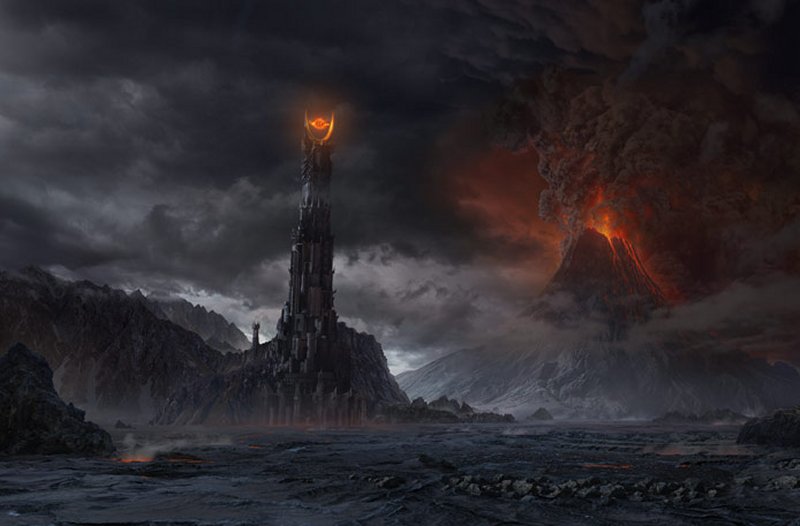
We at Centives are massive Lord of the Rings fans, and keep a flaming log nearby in case of ringwraith surprises. But there has been something that has bugged us for a while.
Where did the orcs get their food from?
Mordor was an ashen wasteland where we never see any plant life (save for the odd tree in the dead swamp), let alone fields full of crops. Old volcanoes are good for making soil fertile, constantly erupting ones are not. But somehow the orcs were eating. How? To get food, the black lands must have been trading with an outside power.
Assuming that the Dark Lord was importing food from abroad, something must have been exported in return. True, Sauron may have forced Easterlings/pirates/dwarves/hobbits to bring him victuals for nothing, but you can only threaten so much with an army that someone else feeds.
Balance of trades
We’re going to go ahead and say that Middle Earth’s economy is roughly comparable to 14th Century England. For reference that’s the time of the Hundred Years War, the Black Death and Bannockburn.
If Mordor was trading something, then we imagine that this would be swords. Sauron had both mines and forges, and so supply should not have been an issue. A medieval sword cost around 6d (6 pence) each. We got in touch with expert Hector Cole, master arrowsmith and archaeological ironworker, who gave us some ideas about medieval sword manufacture.
|
|
Six smiths produce ten swords per day
6d (6 pence) per sword
60d revenue per day |
Bearing in mind that within Mordor itself there isn’t an economy; it’s a command system governed by Sauron and his Nazgul. So mining and manufacture costs aren’t monetary, and all 60d can be spent on other things. Like…
Food. Feeding an army isn’t easy. One option for mass consumption is pig;
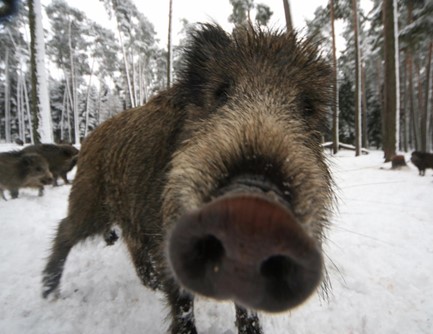 |
A hog roast can feed about 100 at a sitting.
Assuming 3 meals per day this is 33 orcs per pig A medieval pig cost 2 shilling (24 pence) each So 100 orcs can be fed for 72d per day |
So to keep 500 orcs fighting, around 35 orcs are needed to be smithing, and about 1 orc smelting.
Thus for Mordor’s economy to work, constant wars would be needed to keep up the demand for weapons, so that Mordor could trade them for food. This raises the question of how moral it would be for Sauron not to start wars. Due to the requirements of smithing and smelting, about 7% of orcs would be involved in ‘civilian’ roles. When considering firewood, building, and particularly mining, this figure would become much higher.
This is a lot of swords being made per year. Perhaps instead of weapons, Mordor could make farming equipment in its forges. Then to trade it would need a farming people, living quiet lives, who make lots of food but would never go down a mine or do something so unexpected as become a blacksmith.
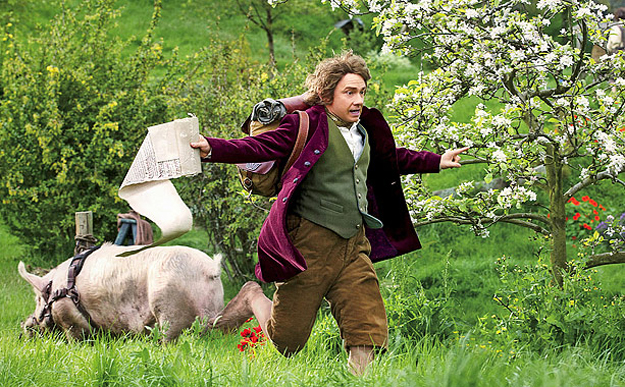
So those are our thoughts on Mordor. At least 7% were civilians. Which makes us less cool with *SPOILER* that massive earthquake at the end of Return of the King. Though, read on for the peculiar case of Mordor’s agrarian sector.
The Case of Nurn
This is for those who, whilst reading the above article, wanted to cry out “but what about Nurn! It’s the place that feeds Mordor’s armies! Nurn!”
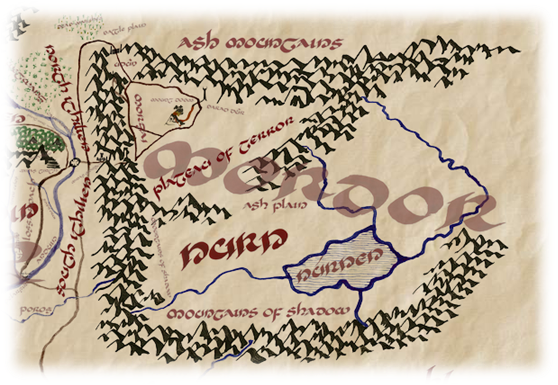
In the literature, Nurn is referred to as having land fertile enough to feed the legions of Sauron. So by all means, perhaps the Dark Lord’s armies are fed by this land. But we’re not so sure for the following reasons:
1) Orcs farming seems odd at best. All medieval states suffered from famine and crop failure, and this was when peasants put every ounce of their skills into providing food for their own families. What a mess an orc would have made of crops we can only imagine.
2) Forced labour is pretty inefficient when it comes to farming. 33% less efficient in the case of Wisbech in Cambridgeshire (14th century).
3) As Merry and Pippin are being taken to Isengard (yes, we know, not Mordor, but still) the orcs complain that “we ain’t had nothing but maggoty bread for 3 stinking days”, suggesting that they are used to a meat diet, which has been interrupted for their hunt.
4) Transporting a quarter-ton of wheat by sea is 14 times cheaper than by land (per mile). Importing makes sense.
5) Look at an orcs mouth. They are not creatures made for bread.
6) Admittedly, Nurn may have been animal grazing, not crop growing. But unless there were very favourable prevailing winds, Mount Doom would be an issue. Crops can tolerate up to 10cm of volcanic ash, animals as little as 1mm.
For our rather detailed references, assumptions and further thoughts, click here.
If this article was your sort of thing, then take a look at our Greatest Hits, and check out our answer to the question of who was the better investment, Bilbo or the Hobbit, or take a look at the population of Panem. And we always love hearing from our readers; by commenting below, emailing us, or:
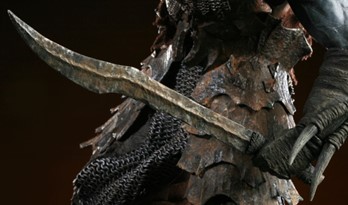



I think if Saurons human allies revered him or Morgoth as a deity its plausible that some sort of tithe was in effect. If this were true, a tithe from the combined peoples of Khand, Harad, Rhun, and Umbar would have been substantial enough to make up for any short comings of the Mordor economy. Thinking from a economic point of view it could be comparable to the catholic church during the crusades. Religious organizations are capable of obtaining massive amounts of wealth with out having to trade goods in return. Sauron could obtain food in the form of tithes and use his power of influence and the promise of conquered lands to the leaders of his human allies as incentive to give aid incase belief in him is not reason enough. This would allow Mordor itself to be more like a enormous military fortification whose sole purpose is geared towards warfare, since those under the influence of Sauron would provide for all of his economic needs. Remember that Saurons influence brought forth the destruction of Numenor, and many were led away from worship of Eru. This means his influence on the minds of the leaders of his human allies would likely be very considerable. People all over the world pay taxes and fees because their leaders tell them to, so if Sauron was controlling the power chieftains of his human allies obtaining wealth would be quite easy for him.
Mumakil, Meat?
It’s nice to know an archeologist – she says:
They do need to look a bit more at the economies of most archaic states (Mesopotamia, Egypt, the Inca, etc.). Some form of coerced labor was standard operating procedure, and many archaic states took 30% of the crop in addition to labor service.
As for using armies to force people to pay tribute, you just quarter them on the populace and they can easily collect more than they eat. No trade goods required, although some usually flow the other way, mostly “imperial” goods used by quisling local elites to signal allegiance. It doesn’t take that many troops to hold an area, especially if big nasty armies can come in to back them up. (Sharkey’s guys in the Shire lacked backup.)
Khand, parts of Rhûn, and Near Harad were all probably paying food tribute. If Rhûn is a Black Sea/Caspian Sea analog, it could provide ample grain (that’s why the Classical Greeks moved into the Black Sea). Khand might provide livestock, if it’s a steppe analog.
Pigs are less than ideal meat sources for armies because you can’t trot them along behind the army. They have to be turned into bacon and salt pork and carried by something else. Cattle, sheep, and goats are conveniently self-mobile. Horses, too, if you don’t object to a bit of horseflesh.
I don’t accept movie!verse Orc teeth as a valid argument against them eating bread. In fact, grain/bean-dominant rations would be a good reason for them to always be hankering for a bit of flesh. (Medieval hunting dogs were always fed bread in the kennel; they only got meat when they were at the kill, to make them keen.)
As for the transport problem, the Sea of Nurn has rivers running conveniently to all parts of Mordor except Gorgoroth. Pack or cart could bring army rations into that comparatively depopulated district.’
Despite some opinions i really liked the article, well thought.
Very entertaining! Not original though. There have been attempts to put fantasy worlds on a more sound economic footing for some time. The following article cites “Designing a quasi-medieval economy for Dungeons and Dragons” as an inspiration. I recall it from my childhood. It kicked off with a rant about how every village/town in every fantasy scenario was completely economically unsustainable.
http://draconianpress.net/ageoftreason/wp-content/uploads/2012/04/The-Legendary-Economy.pdf
I particularly liked the boxed sections in the above on the economic effects of Zombies as labourers, and the productivity boost of using earth elementals (“gnomes”) for ploughing and land clearance.
Not to speak of the dreadful roads tht would make transportation of food (or any other good) very difficult…
Orcs weren’t the ones farming in the area around Nurn. It’s mentioned that that was done by slaves.
The ranger’s, more properly the Dunadain, had been largely reduced to subsistence farming supporting a small group of warriors. They presumably had some small smithies and could also use the facilities at Rivendel on account of their long term alliance with Elrond.
Bree has a traveler’s inn because of the regular travel of dwarves from the Blue Mountains to the Iron Mountains.
Additionally, their used to be significantly more travel and people in Eriador prior to a series of wars launched by Sauron as part of his attempted genocide of the Dunadain. Those wars were ended before the LotR, but there were still ongoing efforts to complete the genocide using orcs, goblins, and trolls.
Red Dawn. The original, I haven’t seen the reboot.
OR…since orcs had no problem eating goblins or each other, for every 2 orcs bred, one would be eaten. Or something like that.
You are describing a rapidly diminishing army or a a perpetual motion machine.
What did orcs eat?
“Rats, and sawdust bread—and, sometimes, each other.”
I’ll bet nobody gets where that quote came from.
Orcs pulled up to the pump and got filled up.
Just like Ford Fairlanes
Read The Last Ringbearer. It’s an alt-history take on LOTR – basic argument is that Mordor ruined its agricultural lands with a misguided irrigation project that wound up salting the land. But, they were pretty technologically advanced and were on the cusp of the industrial revolution. The Wizards feared that tech would eclipse magic and so provoked a war with Mordor, brought back the elves, and presided over a genocide of the peaceful Orocuen people. http://en.wikipedia.org/wiki/The_Last_Ringbearer
Forget Mordor, how can lothlorien work?
I’m more concerned about the economy of Eriador. Why has it been mostly uninhabited for a thousand years?
What do Rangers’ children eat, and where do they sleep? If Rangers are nomadic hunter-gatherers, is it plausible that they do their own smithing and the like?
And why does Bree, built at a crossing of roads that nobody uses, where even a visit from the Shire arouses keen interest, have a travelers’ inn?
In reading the book, I loved that Eriador was empty …
But it doesn’t make much sense, does it?
I’d think the Rangers would have to do smithing and the like. Somewhere. So there were probably big, fat, red-faced, huge-armed, Ranger smiths out in the middle of nowhere 😉
As to Bree, it is actually part of little island of civilization with three other villages … so there would be business for an inn. But what about the Forsaken Inn (I think that’s what it was called) which was a day’s ride east of Breeland? They must’ve had really good ale to stay in business.
But it’s not completely empty! Fellowship (and Bilbo’s company of dwarves) were mostly wandering out of main roads to avoid people (and potential spies), Bilbo’s joruney though mainly led through Great East Road was cutting through so called Lone-lands (which indeed are more desolate as we are told in range of 300 leagues east from Bree there are no, known to Bree-landers, permament settlements) but in the same time there were signs of past communities (ruins of evil looking castles and dark forts, build by Hill-men of Rhudaur), there are references to people living somewhere close to Trollshaws on which three trolls were preying (and Tolkien gave hint that Rangers might have some hidden settlements in the Angle, as well as other places, we are told about ,,hidden fastness in the wilds of Eriador” where Aragorn’s mother lived there could be more such scattered settlements of Dunedain, after all Rangers are only some group of specialized warriors not entirey of the remaining Dunedain).
Dwarves and Wandering Companies of elves were crossing country side in large numbers (dwarves would trade for food with Shire and Breeland, possibly they could sell arms to Rangers, they would offer their services as builders, metalworkers, miners, they could provide coal, om The Hobbit we are told that Thorin and others of exiled Durin’s Folk were mining for coal and iron), Bree-land itself is probably not only those four villages (they appear to be small towns though, well build stone houses, defensive walls with mighty gates, dike and causeway) but some scattered farms and homesteads along with fields and woods, pastures and orchards (Bree, Combe, Archet, Staddle needed some economic background, they traded with Shire but greater part of supplies would be local, there is also curious mention about local growth of pipe weed, though of worse quality Southlinch pipe-weed, so some small plantation on southern slopes of Bree Hill), the Forsaken Inn would too thrive on dwarven traffic, maybe occassional Ranger would stay there or even elves would come by.
We have references to people wandering about Eriador, those who were often held at bay by Shire bounders, possibly some travelling peddlars, other texts (though the exact name escapes my memory) of Tolkien indicate that besides the ones I mentioned there are also scattered inhabitants in other parts of Eriador, in region of Minhiriath there were ,,few secretive hunter folk” (this land was in parts very wooded), in Enedwaith we have of course Dunland with it’s thousands of people and there are apparently some ,,fairly numerous but barbarous fisher folk” on the coasts of Enedwaith, and further south in Druwaith Iaur there were people akin to Woses/Druedain (but this land isn’t part of Eriador so it doesn’t count 🙂 ).
At the Council of Elrond, Boromir says, “…long have I wandered by roads forgotten, seeking the house of Elrond, of which many had heard, but few knew where it lay.” Who was he asking if the lands were empty? Therefore, there were people about.
Eriador used to be the kingdom of Arnor (Gondor’s sister kingdom). The kingdom broke up while at war with Angmar, then a great plague sweeped the land and arnor and most around there broke up. The remnants are the Dunedain. One of the only people unaffected were the Hobbits but they remembered this time as “the fell winter”
Other Tolkien works suggest that the orcs and trolls were derived from elves and ents. Elves like food, but are immortal, in that they can only be killed by martial harm. Ents appear to operate the same way. Thus it does not seem that an elf or ent could starve to death. It stands to reason that orcs and trolls couldn’t starve to death either. This could explain their inordinate interest in eating captives right away.
Perhaps this is why Sauron was so important to them: he provided food that they like but which won’t kill them to do without. Essentially … drugs.
And, just to add more fuel to the fire, there is a much bigger problem of figuring out how wild orcs/goblins fed themselves living underground, particularly when they had difficulty functioning in broad daylight.
I like this line of thought. It would defy reason how the hordes of goblins in Moria could sustain themselves unless in fact they didn’t actually require food to survive.
Extending that thought: what then did the “hordes of goblins in Moria” do with their free time? I’m not being frivolous: residents in our world when it was pre-industrial spent almost all of their time on food production. It certainly doesn’t seem that they spent it on improving their fighting or weapon-making skills.
Two thoughts:
1) it’s rather like playing Dungeons and Dragons, or a first person shooter game. You open a door, and there’s a closed room with 6 goblins in it. DOING WHAT EXACTLY?
2) Alternatively, if they were hunting … where’s the game? Moria would have to be teaming with game to support that population.
Orcs and trolls need food as all other peoples, why they wander so far from their dwelling places? To gather what they need and don’t have close by. Orcs made raids for spoils and slaves on the Vales of Anduin and Eriador (they were bandits who acquired lots of money so maybe they engage in some sort of trade, Azog’s purse of coins idnicates they use currency and know it’s worth, they desired riches of Lonely Mountain in The Hobbit), the orcs were also skilled hunters so providing venison isn’t difficult for them, their raids would too provide much food. Aragorn himself admits that there is food in the wild, it takes skill and time to find it. The orcs aren’t picky in what they eat, so stealing cattle, horses, ponies, donkeys from settlements of men too is an option, they may also catch fish in underground lakes and streams (as well as in those water bodies on the surface, they leave mountains from time to time) possibly they eat some sort of fungi 🙂 caves often have life forms (and there are references to many strange creatures underground, some inhabiting old cavern orcs adapted for their purposes, some of those mysterious cave-dwellers are unknown to them too).
Dude, you do not want to know what 6 goblins are doing together in a locked room.
This is addressed in the book:
“Neither he nor Frodo knew anything of the great slave-worked fields away south in this wide realm, beyond the fumes of the Mountain by the dark sad waters or Lake Núrnen; nor of the great roads that ran away east and south to tributary lands, from which the soldiers of the Tower brought long waggon-trains of goods and booty and fresh slaves.” (902).
Excellent point, slaves and tribute are badly neglected in this analysis (and were significant in real world empires on which Mordor might have been based, like the Mongol and Roman Empires).
And here I thought you were going to talk about the Washington DC economy.
As mentioned; for every two workers bred in D.C., we eat one.
Mt. Doom (Oroduin) was only active when Sauron was near Mordor. I’d feel pretty confident assuming he could probably control the direction of smoke into Gondor to choke its fields instead of his own. Plus, (Nerd Rant) there’s no reason to assume Nurn was farmed by either orcs or slaves. Sauron was probably seen as near godlike to his human allies to the East and South. Farmers could have been Easterlings, Haradiam, Variags or Wainriders. Meat could have been brought as tribute to Sauron to feed his orcs and trolls. Do you really think someone like Sauron would pay for anything?
Tribute is badly overlooked in this analysis, agreed. All fictional, of course, but, assuming Mordor looks anything like the Mongol or Roman Empires, tribute from frightened nearby kingdoms would have been a major part of their economy.
I always thought the map of Mordor was very badly drawn by Tolkien. I mean come on, rectangular mountain ranges all around?
Game of Throngs totally and utterly transformed entirely what fantasybooks can do and be. Tolkeins word is this simplistic (nd racist) analysis of good and bad guys. Game of Thrones with expansive ranges and maps is wht Toklein shoud’ve written.
What? Comparing GoT to LoR is a joke. (I hope.) Tolkein invented a language for LoR! Besides…those maps are supposed to be like the maps from the time. Which, as a matter of fact, they look like. Anyway, GoT is good entertainment and all, but…
And why is LoR racist, by the way? Do you just mean that there are different races of beings, some good and some bad? Are kids books that portray wolves as bad racist? Maybe all the cool kids have talked about this and there’s a good answer to these questions, I’m just wondering…
I did want to ask “what ‘race’ are the Orcs, then?”
It might be the common complaint that “the good guys are all like Northern Europeans and what little we hear about the eastrons and such is kinda like some old stereotypes”, but that’s pretty weak sauce.
Actually you are wrong not all bad guys are from South of East, plenty of ,,northerners” and ,,westerners” that are bad or morally questionable, even elves are not always in right, and they too can do many evil things the very fact they made the Rings of Power is sign they had bad tendencies, they desired power too which never brings anything good with it. Also many of those ,,evil” Haradrim or Easterlings are considered worthy opponents with their own good qualities, they are often just misguided and deceived or simply driven by human desire for conquest an booty :). Even orcs have good qualities like bravery, loyalty, devotion to what they do. They have this pride warrior stance, they too have their own values for example Isengarder orcs accused of eating orc-meat were furious, they angrily denied that and almost a fight broke out, so it was great insult to them, maybe even evil has standards :), the orcs also knew and ackowledged rules of parley when Aragorn gave sign to talks they stopped shooting (in the same time they also committed evil deeds for pleasure, like torturing prisoners or forcing them to work til they die, in great need they would eat them too if necessary for them of course). They are also slaves to their lords and their lives are miserable (deep in heart they hated Morgoth who made them what they are), they deserve some pity as they were ruined and perverted, their violent culture and enormous mental influence of such powers as Sauron and Morgoth really only make things more difficult for them, there is some potential for goodness but it’s hidden deep, orcs are practically what will become of any sentient being reduced to this state of utter degradation. But in the same time Tolkien mentions that it is a man who can be more cruel than any orc (Mouth of Sauron for example was Black Numenorean, though this has nothing to do with his skin tone as he was white-skinned descendant of Numenoreans). Also the people of Numenor though they started with greatest gifts and powers among men they fell into dark ways, corrupted by their own great power and wealth, they became cruel colonial imperialists abusing resources and slaughtering natives, at one point they even started to practice slavery (which is banned in the West especially in culture of Gondor and Arnor, heavily influenced by elven one), trying to save the most noble moral values of old.
You think that Gollum is a simplistic analysis of a bad guy?
Remind me never to play chess with you.
haha youre a fool. Game of Thrones may have moral ambiguity but LOTR had moral ambiguity, norse themes, an immense immense backstory, multiple languages invented, christianic themes, modern day war themes, divine themes, an actual working economy, hundreds more characters, and it had a certain grace that GoT intentionally left out. It wasnt racist, but rather quite the opposite if you actually read it and not just spoonfed information. And the world was formed by Valar, seeing as Sauron was as lesser valar (a maiar), its very likely he rose the mountains himself. Ive read both books and game of thrones is absolutely amazing but is little more than a child when compared to the Lord of the Rings.
Mordor’s rectangular mountain ranges could be a mirror image of the Carpathians in Romania, see link: http://www.sopsr.sk/karpaty/img/karpathia.jpg
And you forgot about south lands….
Or they just ate their enemies…
I think if Saurons human allies revered him or Morgoth as a deity its plausible that some sort of tithe was in effect. If this were true, a tithe from the combined peoples of Khand, Harad, Rhun, and Umbar would have been substantial enough to make up for any short comings of the Mordor economy. Thinking from a economic point of view it could be comparable to the catholic church during the crusades. Religious organizations are capable of obtaining massive amounts of wealth with out having to trade goods in return. Sauron could obtain food in the form of tithes and use his power of influence and the promise of conquered lands to the leaders of his human allies as incentive to give aid incase belief in him is not reason enough. This would allow Mordor itself to be more like a enormous military fortification whose sole purpose is geared towards warfare, since those under the influence of Sauron would provide for all of his economic needs. Remember that Saurons influence brought forth the destruction of Numenor, and many were led away from worship of Eru. This means his influence on the minds of the leaders of his human allies would likely be very considerable. People all over the world pay taxes and fees because their leaders tell them to, so if Sauron was controlling the power chieftains of his human allies obtaining wealth would be quite easy for him.